紧接着上篇博客,把没总结全的继续补充。
(13)set容器
set是用红黑树的平衡二叉索引树的数据结构来实现的,插入时,它会自动调节二叉树排列,把元素放到适合的位置,确保每个子树根节点的键值大于左子树所有的值、小于右子树所有的值,插入重复数据时会忽略。set迭代器采用中序遍历,检索效率高于vector、deque、list,并且会将元素按照升序的序列遍历。set容器中的数值,一经更改,set会根据新值旋转二叉树,以保证平衡,构建set就是为了快速检索(python中的set一旦建立就是一个常量,不能改的)。
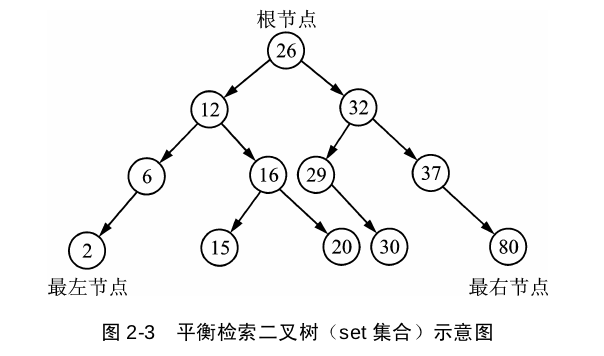
multiset,与set不同之处就是它允许有重复的键值。
set和map的区别如下
set是一种关联式容器,其特性如下:
- set以RBTree作为底层容器
- 所得元素的只有key没有value,value就是key
- 不允许出现键值重复
- 所有的元素都会被自动排序
- 不能通过迭代器来改变set的值,因为set的值就是键
map和set一样是关联式容器,它们的底层容器都是红黑树,区别就在于map的值不作为键,键和值是分开的。它的特性如下:
- map以RBTree作为底层容器
- 所有元素都是键+值存在
- 不允许键重复
- 所有元素是通过键进行自动排序的
- map的键是不能修改的,但是其键对应的值是可以修改的
-
2.set中常用的方法
begin() ,返回set容器的第一个元素
end() ,返回set容器的最后一个元素
clear() ,删除set容器中的所有的元素
empty() ,判断set容器是否为空
max_size() ,返回set容器可能包含的元素最大个数
size() ,返回当前set容器中的元素个数
rbegin ,返回的值和end()相同
rend() ,返回的值和rbegin()相同
-
1 #include <iostream> 2 #include <set> 3 4 using namespace std; 5 6 int main() 7 { 8 set<int> s; 9 s.insert(1); 10 s.insert(2); 11 s.insert(3); 12 s.insert(1); 13 cout<<"set 的 size 值为 :"<<s.size()<<endl; 14 cout<<"set 的 maxsize的值为 :"<<s.max_size()<<endl; 15 cout<<"set 中的第一个元素是 :"<<*s.begin()<<endl; 16 cout<<"set 中的最后一个元素是:"<<*s.end()<<endl; 17 s.clear(); 18 if(s.empty()) 19 { 20 cout<<"set 为空 !!!"<<endl; 21 } 22 cout<<"set 的 size 值为 :"<<s.size()<<endl; 23 cout<<"set 的 maxsize的值为 :"<<s.max_size()<<endl; 24 return 0; 25 }
-
小结:插入3之后虽然插入了一个1,但是我们发现set中最后一个值仍然是3哈,这就是set 。还要注意begin() 和 end()函数是不检查set是否为空的,使用前最好使用empty()检验一下set是否为空
- count() 用来查找set中某个某个键值出现的次数。这个函数在set并不是很实用,因为一个键值在set只可能出现0或1次,这样就变成了判断某一键值是否在set出现过了。
-
1 #include <iostream> 2 #include <set> 3 4 using namespace std; 5 6 int main() 7 { 8 set<int> s; 9 set<int>::const_iterator iter; 10 set<int>::iterator first; 11 set<int>::iterator second; 12 for(int i = 1 ; i <= 10 ; ++i) 13 { 14 s.insert(i); 15 } 16 //第一种删除 17 s.erase(s.begin()); 18 //第二种删除 19 first = s.begin(); 20 second = s.begin(); 21 second++; 22 second++; 23 s.erase(first,second); 24 //第三种删除 25 s.erase(8); 26 cout<<"删除后 set 中元素是 :"; 27 for(iter = s.begin() ; iter != s.end() ; ++iter) 28 { 29 cout<<*iter<<" "; 30 } 31 cout<<endl; 32 return 0; 33
-
1 #include <iostream> 2 #include <set> 3 4 using namespace std; 5 6 int main() 7 { 8 set<int> s; 9 s.insert(1); 10 s.insert(2); 11 s.insert(3); 12 s.insert(1); 13 cout<<"set 中 1 出现的次数是 :"<<s.count(1)<<endl; 14 cout<<"set 中 4 出现的次数是 :"<<s.count(4)<<endl; 15 return 0; 16 }
1 #include <iostream> 2 #include <set> 3 4 using namespace std; 5 6 int main() 7 { 8 set<int> s; 9 set<int>::const_iterator iter; 10 set<int>::iterator first; 11 set<int>::iterator second; 12 for(int i = 1 ; i <= 10 ; ++i) 13 { 14 s.insert(i); 15 } 16 //第一种删除 17 s.erase(s.begin()); 18 //第二种删除 19 first = s.begin(); 20 second = s.begin(); 21 second++; 22 second++; 23 s.erase(first,second); 24 //第三种删除 25 s.erase(8); 26 cout<<"删除后 set 中元素是 :"; 27 for(iter = s.begin() ; iter != s.end() ; ++iter) 28 { 29 cout<<*iter<<" "; 30 } 31 cout<<endl; 32 return 0; 33
(14)正反遍历,迭代器iterator、reverse_iterator
#include<iostream> #include<set> using namespace std; int main() { set<int> v; v.insert(1); v.insert(3); v.insert(5); v.insert(2); v.insert(4); v.insert(3); //中序遍历 升序遍历 for(set<int>::iterator it = v.begin(); it != v.end(); ++it) { cout << *it << " "; } cout << endl; for(set<int>::reverse_iterator rit = v.rbegin(); rit != v.rend(); ++rit) { cout << *rit << " "; } cout << endl; return 0; }

(15) 自定义比较函数,insert的时候,set会使用默认的比较函数(升序),很多情况下需要自己编写比较函数。
1、如果元素不是结构体,可以编写比较函数,下面这个例子是用降序排列的(和上例插入数据相同):
#include<iostream> #include<set> using namespace std; struct Comp { //重载() bool operator()(const int &a, const int &b) { return a > b; } }; int main() { set<int,Comp> v; v.insert(1); v.insert(3); v.insert(5); v.insert(2); v.insert(4); v.insert(3); for(set<int,Comp>::iterator it = v.begin(); it != v.end(); ++it) { cout << *it << " "; } cout << endl; for(set<int,Comp>::reverse_iterator rit = v.rbegin(); rit != v.rend(); ++rit) { cout << *rit << " "; } cout << endl; return 0; }

2、元素本身就是结构体,直接把比较函数写在结构体内部,下面的例子依然降序:
#include<iostream> #include<set> #include<string> using namespace std; struct Info { string name; double score; //重载 < bool operator < (const Info &a) const { return a.score < score; } }; int main() { set<Info> s; Info info; info.name = "abc"; info.score = 123.3; s.insert(info); info.name = "EDF"; info.score = -23.53; s.insert(info); info.name = "xyz"; info.score = 73.3; s.insert(info); for(set<Info>::iterator it = s.begin(); it != s.end(); ++it) { cout << (*it).name << ":" << (*it).score << endl; } cout << endl; for(set<Info>::reverse_iterator rit = s.rbegin(); rit != s.rend(); ++rit) { cout << (*rit).name << ":" << (*rit).score << endl; } cout << endl; return 0; }
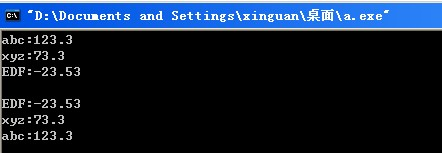
(16)map的用法
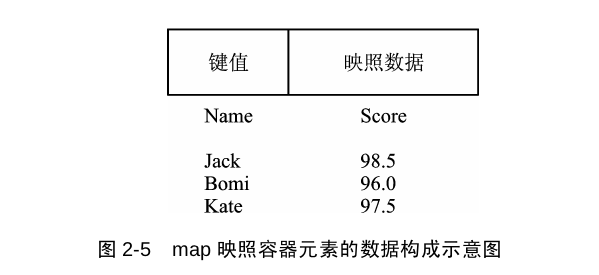
#include<iostream> #include<map> #include<string> using namespace std; int main() { map<string,double> m; //声明即插入 m["li"] = 123.4; m["wang"] = 23.1; m["zhang"] = -21.9; m["abc"] = 12.1; for(map<string,double>::iterator it = m.begin(); it != m.end(); ++it) { //first --> key second --> value cout << (*it).first << ":" << (*it).second << endl; } cout << endl; return 0; }

用map实现数字分离
string --> number
之前用string进行过数字分离,现在使用map
#include<iostream> #include<map> #include<string> using namespace std; int main() { map<char,int> m; m['0'] = 0; m['1'] = 1; m['2'] = 2; m['3'] = 3; m['4'] = 4; m['5'] = 5; m['6'] = 6; m['7'] = 7; m['8'] = 8; m['9'] = 9; /* 等价于 for(int i = 0; i < 10; ++i) { m['0' + i] = i; } */ string sa; sa = "9876543210"; int sum = 0; for( int i = 0; i < sa.length(); ++i) { sum += m[sa[i]]; } cout << sum << endl; return 0; }
number --> string
#include <iostream> #include <map> #include <string> using namespace std; int main() { map<int,char> m; for(int i = 0; i < 10; ++i) { m[i] = '0' + i; } int n = 7; string out = "the number is :"; cout << out + m[n] << endl; return 0; }

(17)multimap
multimap由于允许有重复的元素,所以元素插入、删除、查找都与map不同。
插入insert(pair<a,b>(value1,value2))
#include <iostream> #include <map> #include <string> using namespace std; int main() { multimap<string,double> m; m.insert(pair<string,double>("Abc",123.2)); m.insert(pair<string,double>("Abc",123.2)); m.insert(pair<string,double>("xyz",-43.2)); m.insert(pair<string,double>("dew",43.2)); for(multimap<string,double>::iterator it = m.begin(); it != m.end(); ++it ) { cout << (*it).first << ":" << (*it).second << endl; } cout << endl; return 0; }

(18)deque
deque和vector一样,采用线性表,与vector唯一不同的是,deque采用的分块的线性存储结构,每块大小一般为512字节,称为一个deque块,所有的deque块使用一个Map块进行管理,每个map数据项记录各个deque块的首地址,这样以来,deque块在头部和尾部都可已插入和删除元素,而不需要移动其它元素。使用push_back()方法在尾部插入元素,使用push_front()方法在首部插入元素,使用insert()方法在中间插入元素。一般来说,当考虑容器元素的内存分配策略和操作的性能时,deque相对vectore更有优势。(下面这个图,我感觉Map块就是一个list< map<deque名字,deque地址> >)
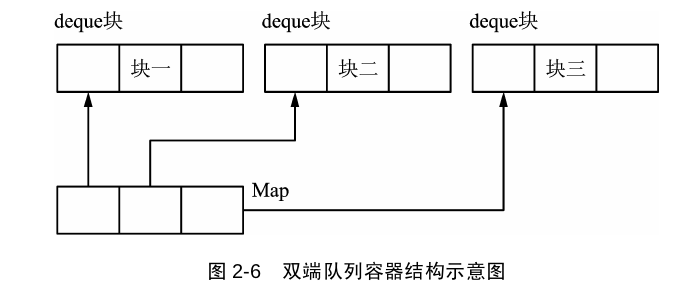
1 #include <iostream> 2 #include <deque> 3 4 using namespace std; 5 6 int main() 7 { 8 deque<int> d; 9 10 //尾部插入 11 d.push_back(1); 12 d.push_back(3); 13 d.push_back(2); 14 for(deque<int>::iterator it = d.begin(); it != d.end(); ++it ) 15 { 16 cout << (*it) << " "; 17 } 18 cout << endl << endl; 19 20 //头部插入 21 d.push_front(10); 22 d.push_front(-23); 23 for(deque<int>::iterator it = d.begin(); it != d.end(); ++it ) 24 { 25 cout << (*it) << " "; 26 } 27 cout << endl << endl; 28 29 d.insert(d.begin() + 2,9999); 30 for(deque<int>::iterator it = d.begin(); it != d.end(); ++it ) 31 { 32 cout << (*it) << " "; 33 } 34 cout << endl << endl; 35 36 //反方向遍历 37 for(deque<int>::reverse_iterator rit = d.rbegin(); rit != d.rend(); ++rit ) 38 { 39 cout << (*rit) << " "; 40 } 41 cout << endl << endl; 42 43 //删除元素pop pop_front从头部删除元素 pop_back从尾部删除元素 erase中间删除 clear全删 44 d.clear(); 45 d.push_back(1); 46 d.push_back(2); 47 d.push_back(3); 48 d.push_back(4); 49 d.push_back(5); 50 d.push_back(6); 51 d.push_back(7); 52 d.push_back(8); 53 for(deque<int>::iterator it = d.begin(); it != d.end(); ++it ) 54 { 55 cout << (*it) << " "; 56 } 57 cout << endl; 58 59 d.pop_front(); 60 d.pop_front(); 61 for(deque<int>::iterator it = d.begin(); it != d.end(); ++it ) 62 { 63 cout << (*it) << " "; 64 } 65 cout << endl; 66 67 d.pop_back(); 68 d.pop_back(); 69 for(deque<int>::iterator it = d.begin(); it != d.end(); ++it ) 70 { 71 cout << (*it) << " "; 72 } 73 cout << endl; 74 75 d.erase(d.begin() + 1); 76 for(deque<int>::iterator it = d.begin(); it != d.end(); ++it ) 77 { 78 cout << (*it) << " "; 79 } 80 cout << endl; 81 return 0; 82 }
(19)list
list<int> l
插入:push_back尾部,push_front头部,insert方法前往迭代器位置处插入元素,链表自动扩张,迭代器只能使用++--操作,不能用+n -n,因为元素不是物理相连的。
遍历:iterator和reverse_iterator正反遍历
删除:pop_front删除链表首元素;pop_back()删除链表尾部元素;erase(迭代器)删除迭代器位置的元素,注意只能使用++--到达想删除的位置;remove(key) 删除链表中所有key的元素,clear()清空链表。
查找:it = find(l.begin(),l.end(),key)
排序:l.sort()
删除连续重复元素:l.unique() 【2 8 1 1 1 5 1】 --> 【 2 8 1 5 1】
(20)bitset
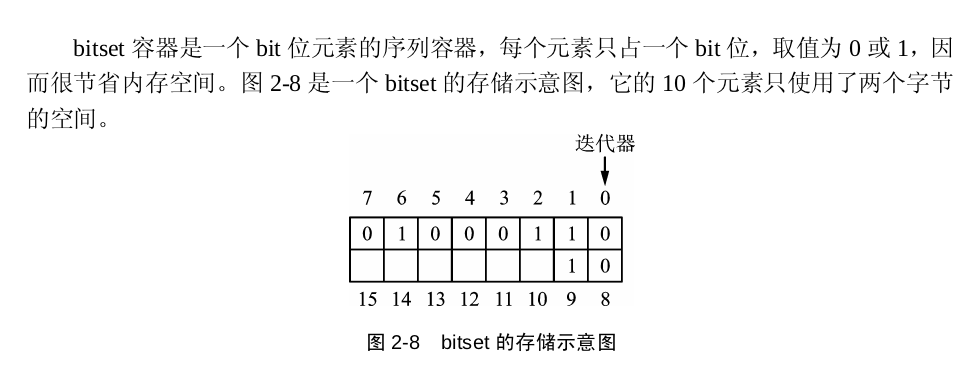
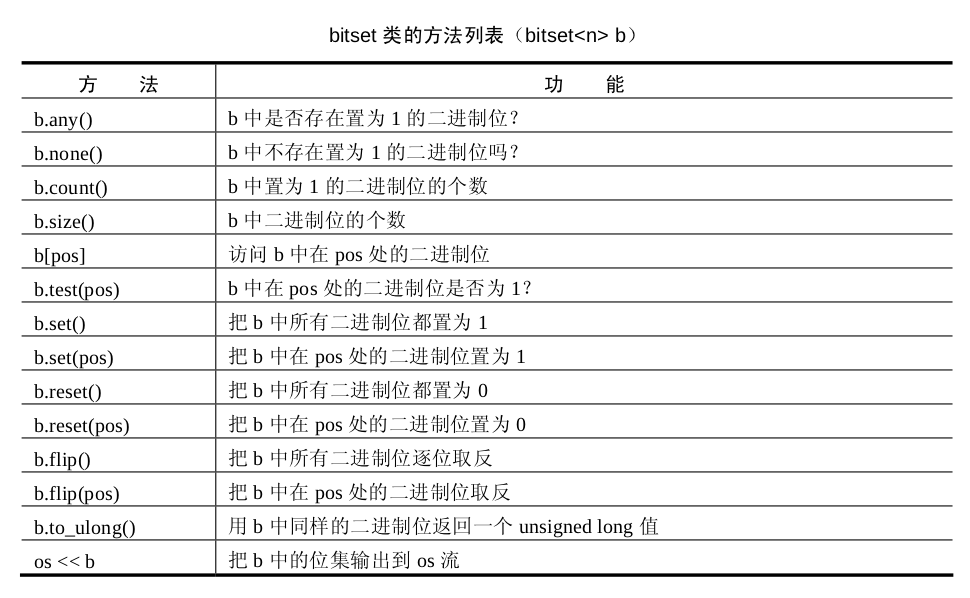
(21)stack(后进先出)
这个印象深刻,学数据结构的时候做表达式求值的就是用的栈。

1 #include <iostream> 2 #include <stack> 3 using namespace std; 4 5 int main() 6 { 7 8 stack<int> s; 9 s.push(1); 10 s.push(2); 11 s.push(4); 12 s.push(5); 13 14 cout << s.size() << endl; 15 16 while(s.empty() != true) 17 { 18 cout << s.top() << endl; 19 s.pop(); 20 } 21 return 0; 22 }
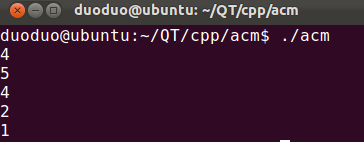
(22)queue(先进先出)

queue有入队push(插入)、出队pop(删除)、读取队首元素front、读取队尾元素back、empty,size这几种方法
(23)priority_queue(最大元素先出)


1 #include <iostream> 2 #include <queue> 3 using namespace std; 4 5 int main() 6 { 7 8 priority_queue<int> pq; 9 10 pq.push(1); 11 pq.push(3); 12 pq.push(2); 13 pq.push(8); 14 pq.push(9); 15 pq.push(0); 16 17 cout << "size: " << pq.size() << endl; 18 19 while(pq.empty() != true) 20 { 21 cout << pq.top() << endl; 22 pq.pop(); 23 } 24 return 0; 25 }
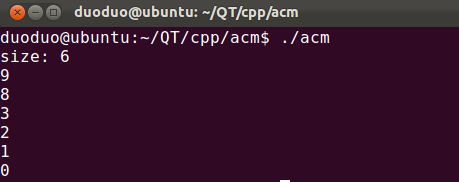
重载操作符同set重载操作符。
参考:https://www.cnblogs.com/CnZyy/p/3317999.html